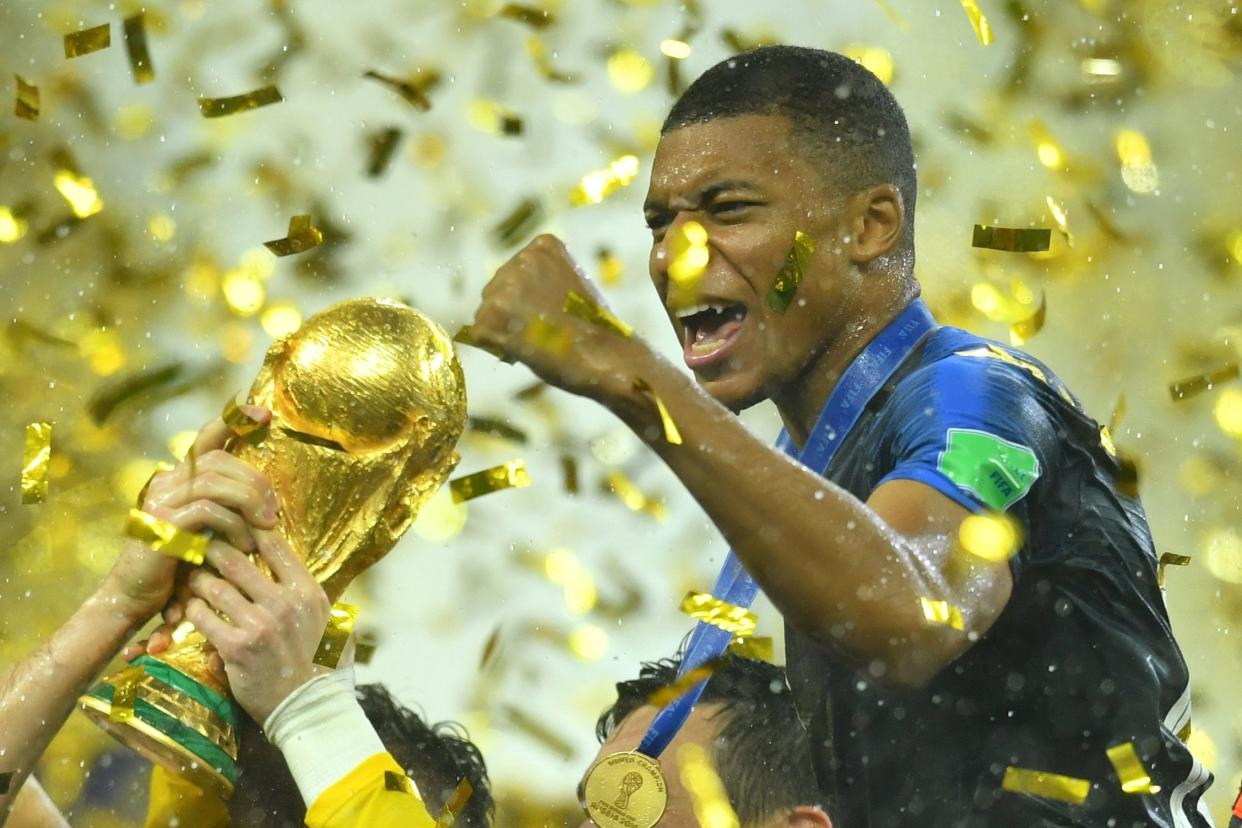France young guns send warning to World Cup rivals as they set sights on more global glory

The worrying thing for the rest of us is France could become a lot better than this. There are not many countries that boast the sheer strength in depth of Les Bleus and yet the starting line-up that won the World Cup here was one of the youngest in history.
The average age of World Cup-winning teams for the 19 tournaments up to the 2014 staging in Brazil, according to research conducted by the BBC, was 27.5 years old.
Germany’s successful team from four years ago came in slightly below average at 26.8, yet Didier Deschamps’ side average just 25.8, the second-lowest successful team to start a World Cup Final, fractionally behind Argentina’s 1978 winners.
France coach Deschamps — who becomes only the third individual, after Franz Beckenbauer and Mario Zagallo, to win the World Cup as a player and manager — brought that figure down in the two years since Euro 2016 by introducing Benjamin Pavard and Lucas Hernandez, among others, to form a back-four all aged 25 or under.
France’s defence was breached twice — once in comical fashion, courtesy of a howler from Hugo Lloris — but that young unit defended well enough to repel a Croatia side who defied both fatigue and their underdog status to provide a stern test of Deschamps and his players’ ability to exorcise the demons of losing the last major tournament final on home soil.
Ivan Perisic had cancelled out an own goal from Mario Mandzukic before the game’s controversial moment arrived just before the interval. Antoine Griezmann’s corner was flicked on by Blaise Matuidi, striking Perisic’s hand.
France protested, Argentine referee Nestor Pitana was encouraged to review by the video assistant and, upon checking the replay, he awarded the penalty.
Precisely the kind of controversy VAR was introduced to avoid had a significant bearing on this final. Griezmann tucked away the spot-kick and, after the restart, France began to play. Paul Pogba swept home a third and when Kylian Mbappe fired their fourth, Croatia risked being humiliated.
Lloris spared their blushes to a degree by needlessly gifting Mandzukic — and Croatia — a lifeline, but France saw the game out with a maturity beyond their years, one forged from harsh lessons of the past.
Deschamps said: “Two years ago, it was so, so painful to let the opportunity of being European champions pass, but maybe if we had been European champions then we would not be world champions today.
“I did learn a lot [from the last final]. We lowered the importance of the match, we tried to stay relaxed this time. The players knew why they were there: they had to get that shining star [to mark a second World Cup win].
“It is wonderful. Those 23 players will be linked for ever. They might follow different paths but they will be marked together and from this moment on, they are going to be different.
“They will not be the same because they are world champions. It won’t change their lives but, professionally, there is nothing above that.
“Maybe they are going to win other titles and, of course, I don’t want to undermine any title, but world champion, when you are a professional football player, there is nothing above that.”
Well, there is one thing: double world champions.
France were installed by bookmakers as the early favourites for Qatar 2022 and it is difficult not to think they will improve again. Dominating tournament football over a sustained period is reserved for the very best sides of all time — only Italy and Brazil have ever managed to retain the trophy — but France can aim that high.
Paul Pogba has become the player Manchester United crave to see on a regular basis in Deschamps’ 4-4-2 shape — one that conventional wisdom dictates is not supposed to suit him — while French journalists afterwards were speaking of Griezmann in the same breath as Michel Platini and Zinedine Zidane. But, as is so often the case, it is the promise of youth that sets the mind racing about what this French team is capable of.
The supporting cast last night included 21-year-old Ousmane Dembele, Thomas Lemar (23 next month), Nabil Fekir (24), Benjamin Mendy (24 tomorrow) and Corentin Tolisso (23), not to mention players in their early to mid-twenties who did not even make the squad, including Kingsley Coman, Anthony Martial, Aymeric Laporte and Adrien Rabiot.
It is a frightening list — especially as Gareth Southgate hopes England can improve in the same period — but the star will surely be the irrepressible Mbappe.
A child-like grin came over his face as the anthems were played in the Luzhniki Stadium, indicative of a 19-year-old able to enjoy himself on the grandest stage, rather than feel inhibited by it. There were only flashes of his best here, but in those moments he shone brighter than the lightning which provided a dramatic backdrop to the final hour of this game, accelerating past panicked Croatia defenders with ease.

He became only the third teenager to play in a World Cup Final and just the second to score, after Pele in 1958, yet still Deschamps had a warning.
“Kylian Mbappe is only 19 and I hope he is going to be world champion again,” he said. “One never knows.
“Twenty years ago, there was David Trezeguet and Thierry Henry, also 19, but they didn’t become world champions again. My players are world champions now and my greatest joy is linked to theirs. I want to see them like this.”
The 49-year-old Deschamps, who has a contract with the French Football Federation until 2020, has had his detractors, with some calling for France to play with greater flair.
That could yet come next. Anything could come next.

 Yahoo News
Yahoo News 
